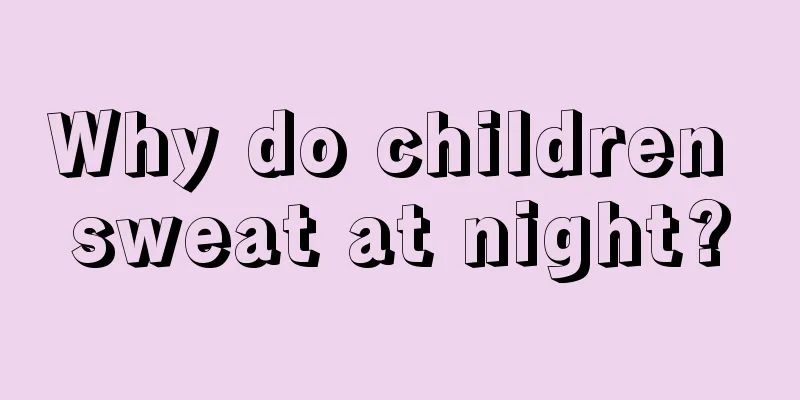Why do children sweat at night?

|
When mothers are soothing their babies to sleep, do they find symptoms of excessive sweating in their babies? Many babies sweat easily when they sleep, especially at night, and mothers don’t know the reason. Why do young children sweat at night? The following is a brief introduction for mothers. Many mothers will encounter this situation when taking care of their babies: when the baby goes to sleep at night, she does not cover him with anything, and when she touches her head, it is full of sweat. And I didn't feel hot at all. Is excessive sweating due to calcium deficiency? There are five situations in which children have physiological hyperhidrosis It is common for babies to sweat during sleep, and it is not always a symptom of weakness or illness. Many parents believe that their children’s constant sweating is due to their weak constitution. In fact, a considerable number of children suffer from physiological hyperhidrosis. Physiological hyperhidrosis is more common in the head and neck, often occurring within half an hour after falling asleep, and sweating stops in about an hour. Infants and young children have an active metabolism and are active and lively. Some of them cannot rest even after going to bed at night, so they may sweat on their heads after falling asleep. The so-called physiological hyperhidrosis refers to sweating during sleep when the child is well-developed, healthy, and has no disease. Parents are often accustomed to deciding the best environmental temperature for their children based on their own subjective feelings, and like to cover their babies with more blankets and keep them tightly covered. Because children's brain and nervous system are not yet fully developed and they are in the growth and development period, their body metabolism is very active. Coupled with the stimulation of overheating, they can only regulate normal body temperature by sweating to evaporate the heat in the body. Some active children exercise a lot during the day and generate a lot of heat. The body is unable to dissipate the excess heat through sweating, so the heat accumulates in the baby's body, and the baby's body temperature can reach around 38°C at night. After the baby falls asleep, the heat generated decreases, the sensitivity of the sympathetic nerves decreases, and the body dissipates excess heat through sweating to maintain normal body temperature. In addition, drinking milk, malted milk or eating chocolate before going to bed can also cause sweating in children. Some parents give their children milk, malted milk, etc. before they go to sleep. After the child falls asleep, the body produces a large amount of heat, which is mainly dissipated through sweating through the skin. In addition, too high room temperature or excessive warmth can also cause children to sweat while sleeping, which are all physiological sweating. The weather is hot and stuffy in summer and the bedroom is poorly ventilated, so babies are more likely to sweat. This type of sweating is called "physiological sweating" in medicine. It usually occurs in the first half of the night when you just fall asleep, and the sweat gradually disappears after deep sleep. Parents do not need to worry too much about physiological sweating. This is just a physiological phenomenon during the baby's growth process. As the baby grows older, this phenomenon will gradually decrease. Why do young children sweat at night? Through the above introduction, we can also make a simple judgment, especially the description of the baby's physiological hyperhidrosis. From the above content, we can judge whether the baby is sweating physiologically through the symptoms of physiological sweating. If not, we can also take the baby to the hospital for treatment in time so that the baby can recover as soon as possible. |
<<: What is the best way to treat snoring in children?
>>: What causes yellow baby teeth?
Recommend
What should I do if my baby is fussy at night?
I believe that every mother will encounter the pr...
Baby high fever throat herpes
Baby's throat herpes can easily cause high fe...
Dietary considerations for children with precocious puberty
Nowadays, many foods on the market contain hormon...
Can children take roxithromycin?
In daily life, roxithromycin is a common drug. Ch...
What should I do if my child has a high fever of 39 degrees?
When a child has a high fever of 39 degrees, he m...
What to do if your baby retches while eating
Babies are a piece of flesh that falls from their...
How to relieve the baby's poop for two days
Parents are very concerned about their children&#...
Is yogurt good for babies?
Nowadays, every baby is spoiled by his parents, a...
The weight of a three and a half month old baby and its health
A baby is the apple of every mother's eye. Wh...
Children with recurrent conjunctivitis
Many parents are very troubled by the frequent re...
What are the symptoms of vitamin d deficiency in children
There are many things to pay attention to in the ...
How to prevent asthma relapses in children?
Childhood asthma is a very common respiratory dis...
Children's education methods
The education of children is very important, whic...
Upper respiratory tract infection in children
Respiratory tract infection is one of the disease...
The child's body itches
The child's body is in the development stage,...









